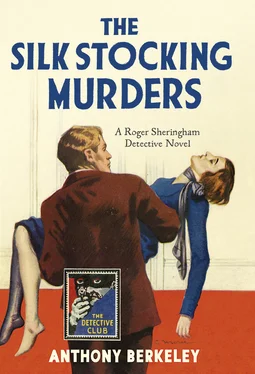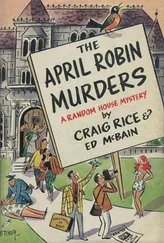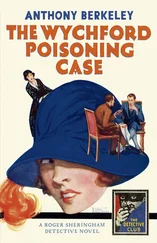Roger’s imagination was a vivid one. He felt rather sick.
‘But why,’ he asked himself, frowning, ‘didn’t she grip the stocking above her neck and pull on that, at any rate for a few minutes? She could have been saved if she had. But I suppose there wasn’t enough of it to grip on.’
He turned his attention to the top of the door. There at the sides, and some little way down as well, were other scratches, fainter, but not to be mistaken. He walked out into the kitchen.
‘Moira,’ he said abruptly, ‘what were Unity’s nails like? Do you happen to remember?’
‘Yes,’ said Miss Carruthers, with a little shiver. ‘All broken and filled with paint and stuff.’
‘Ah!’ said Roger.
‘And she used to keep them so nice,’ said Miss Carruthers.
London having thus proved blank, Roger determined to try the country. He felt a little diffident about intruding upon the grief-stricken family, and uncertain whether to acquaint the vicar with his suspicions or not. In the end he decided not to do so until he had more evidence to support them; what he possessed already would merely add to the old man’s distress without effecting anything helpful. He trusted to his usual luck to acquire the information he wanted (if it was to be acquired) by some other means.
Having made up his mind, Roger acted with his usual impulsiveness. If he were to go at all, he would go the next day. But the next day was a Friday, and Tuesdays and Fridays were the days on which he spent the morning at The Courier offices. Very well, then; he would write his article that evening, merely call in at The Courier building to leave it and collect his post, and so catch an early train down to Dorsetshire. Excellent.
To turn out two articles a week for several months on the subject of sudden death is not, after the sixth month or so, an easy task. Having exhausted most of the topics on which he had wanted to spread himself, Roger was beginning to find the search for fresh ones getting rather too arduous. And now that he was anxious to polish one off in a hurry, of course no subject would present itself. After nibbling the end of his fountain-pen for half-an-hour, Roger ran down into the street to buy an evening paper. When inspiration fails, a newspaper will sometimes work wonders.
This one certainly came up to expectations. On the front page, in gently leaded type to show that, while startling, it could hardly be considered important, were the following headlines:
LONDON FLAT TRAGEDY
GIRL HANGS HERSELF WITH OWN STOCKING
PATHETIC LETTER
Roger was able to write a very informative article indeed, all about mass-suggestion, neurotic types, predisposition to suicide and how it is stimulated by example, and the lack of originality in most of us. ‘Within a few weeks of the first genius discovering that he could end his life by lying with his head in a gas-oven,’ wrote Roger, ‘more than a dozen had followed his lead.’ And he went on to prove that a novel method of ending life, whether one’s own or another’s, acts in such a way upon a certain type of mind that it constitutes a veritable stimulus to death. He instanced Dr Palmer and Dr Dove, Patrick Mahon and Norman Thorne, and, of course, the twin stocking tragedies. Altogether the article was in Roger’s best vein, and he was not a little pleased with it.
The next day he set off for Dorsetshire.
In his morning paper (not The Daily Courier ) which he had been saving up to read in the train, was a rather fuller account of the tragedy, though now relegated to an unimportant page. Roger was quite gratified to observe that such details as were given corresponded almost exactly with those of Janet’s case; its perpetrator evidently corresponded exactly to the type which he had described so meticulously last night. Whatever he might feel for Janet, Roger had no sympathy with this girl; she was of the kind which is far better out of this world than in it. And she had copied poor little Janet with a slavishness that was really rather nauseating: the silk stocking tied in a single loop and twisted over the door, the screwed hook on the further side, the bare leg, the unsigned note—they were all there.
Her name was Elsie Benham, ‘described as an actress’, as the paper cautiously put it. (‘And of course we know what that means,’ Roger commented caustically. ‘Why do they always “describe themselves as actresses?” It’s uncommonly tough on the real ones.’) She was known as a habituée of night-clubs (‘That’s more like it’) and had been seen at one on the night of the tragedy. She was alone, and a friend who spoke to her mentioned that she seemed depressed. She left alone, at two o’clock in the morning, and must have killed herself very soon after reaching the flat which she shared with another friend who is at the moment out of London (‘Euphemism for weekending in Paris,’ observed the sarcastic reader), for when she was discovered yesterday afternoon by a man who possessed a key to the flat (‘As I said’) the doctor who was hurriedly summoned gave it as his opinion that she had been dead for at least twelve hours. ‘Which is not a bad sentence, even for this rag,’ thought Roger.
He skimmed through the rest of the report, tossed the newspaper aside and opened a novel.
It was not till two hours later, as he was idly watching the fields fly past the window, that two things struck Roger. The evening paper had exaggerated when it spoke of the pathetic ‘letter’ left by the dead girl. It was not a letter; it was merely a quotation. ‘How wonderful is Death!’ she had written on a blank piece of paper. ‘Death and his brother Sleep.’
‘How wonderful is Death.
Death and his brother Sleep,’
murmured Roger. ‘It’s curious that a lady “described as an actress” and known as a habituée of night-clubs should choose to quote Queen Mab on such an occasion. It’s curious that she could quote Shelley at all. It’s very curious that she would quote him correctly; I’d have taken a small bet that any lady “described as an actress” who might improbably have a nodding acquaintance with Shelley, would quote: “How beautiful is Death.” Very curious; but not, apparently, impossible. Well, well, there must be more things in our night-clubs, Sheringham, than are dreamt of in your philosophy.’
He watched a few more fields slide past.
‘And here’s another funny thing,’ thought Roger. ‘All the papers this time feature the bare leg. But the bare leg wasn’t mentioned before, in any of the accounts I read. When Moira told me, it was complete news to me. I wonder how this woman got hold of that. I suppose it must have been alluded to in some paper I never saw; though I certainly thought I’d studied them all at one time or another. Curious.’
He went on watching the fields, and set to wondering what he was going to say to Mr Manners. The nearer he got to Dorsetshire, the more impertinent his mission began to appear.
In the end he decided not to try the village inn at Little Mitcham, as had been his first intention, but to put up in the neighbouring town of Monckton Regis. This would look less intrusive. He could then, finding himself so near to Mr Manners, go over to Little Mitcham to pay his respects with perfect propriety.
This course he duly followed. Mr Manners welcomed him eagerly, carried him off at once to his study, and plied him with questions which Roger found a good deal of difficulty in answering tactfully. The old man seemed very depressed, as was only to be expected, but his grief was dignified and unembarrassing. Pressed with warmth to stay to luncheon and meet the rest of the family, Roger acceded after protest, quietening his conscience with the reflection that at such a time as this the presence of a stranger might be a blessing in disguise to the stricken household; at the least it would take their minds for a few hours off their loss.
Читать дальше












